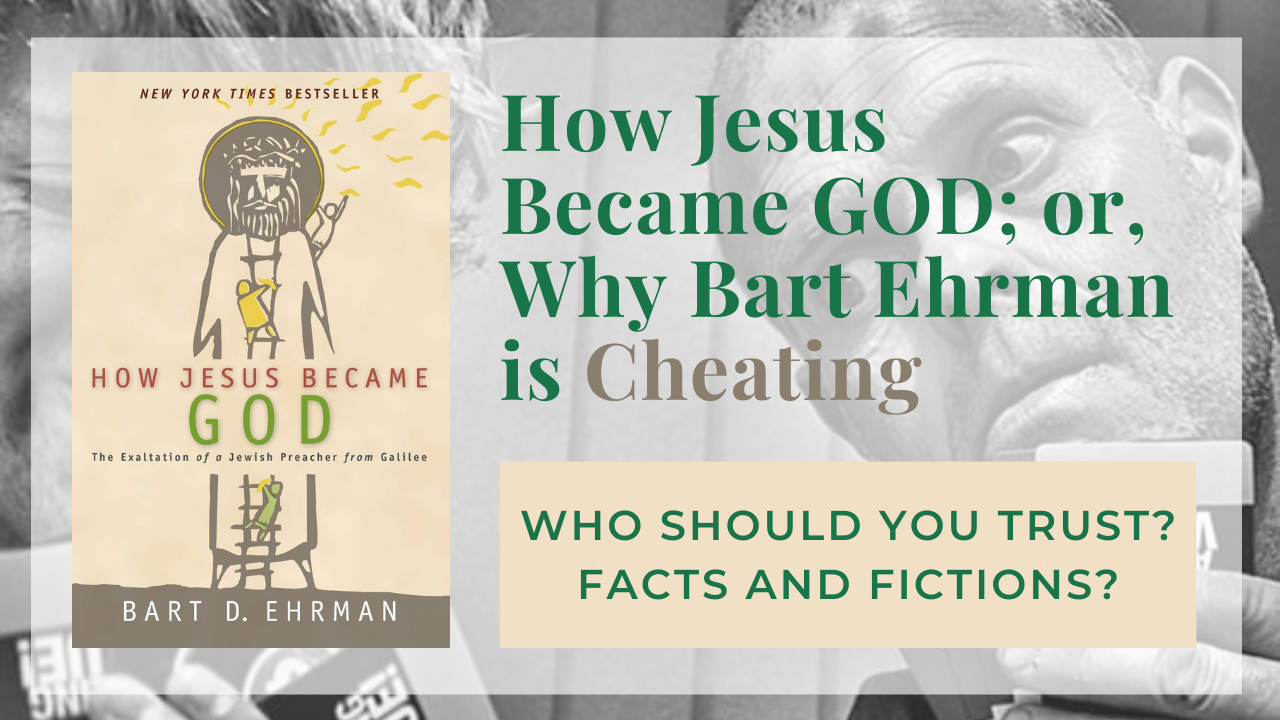Continuing the “Why Bart Ehrman is Cheating” series on his book, “How Jesus Became God”, we look at his claims for being a historian, and how Ehrman is cheating by setting up false opposition between “scientific facts” and “religious fictions”, between agnostic historians and credulous Bible scholars.
That’s what this second video in the series is all about. Here is the first one. The transcript is below.
TRANSCRIPT
When it comes to “Is Jesus really God?” should you trust me or Bart Ehrman? It’s a simple question?
I mean he’s a multiple New York Times best seller, he’s been on the History Channel, Dateline, and CNN, and, may favorite, the Colbert Repore. And I’m just a guy with a youtube channel and a sweet logo…[drop Grassroots Christianity logo].
But the most important distinction between Ehrman and myself, according to Ehrman, is that he is a historian and I am a believer.
He is a historian that will dispel the fantasies of belief and clean away the cobwebs of myth to get at the truth.
And I’m just a theologian who must protect received doctrine. I’m just a pastor whose job security depends on people not finding out the truth.
Well, first off. Ehrman is not a trained historian specifically. He got his training in new testament textual criticism (the study of all copies of New Testament manuscripts and how they all relate to each other). So he is really a New Testament scholar, which as any New Testament scholar would tell you, works with history, and with texts, and with interpreting texts, and with theology.
So really, Ehrman is a New Testament scholar arguing and debating with other New Testament scholars.
But he calls himself a historian throughout.
He says, quote “I am no longer a believer. Instead, I am a historian of early Christianity” who studies the “the rise of the Christian religion from a historian perspective.” “As a historian I am no longer obsessed with the theological question of how God became man, but with the historical question of how a man became God.” (2).
Ok. So why does Ehrman call himself a historian rather than a New Testament scholar, or by his actual title of James A. Gray Distinguished Professor of Religious Studies (Chapel Hill, University of North Carolina)?
It is clear Ehrman wants us to think of him as working on the side of scientific fact against religious fiction.
But that this is not how historical study works. Ehrman speaks with the confidence of a mathematician or a physicist about facts. But really, historical reconstructions don’t have that much certainty—and Ehrman even sometimes admits that he deals with probabilities, speculations, and interpretations.
So, as a believer, a theologian, a pastor, am I biased.
Yes. If by that you mean I have an interpretive grid and assumptions that help me understand reality, some of which are that
- the natural world is not all there is (which, like, most of the world believes),
- that the foundation of reality is a transcendent and yet personal being that we call God,
- and that reality is accessed and known through an integration of affective and cognitive abilities (or, I strive to integrate both thinking and feeling, or right-brain and left-brain processing).
And Erhman is biased also, and by that I just mean he has assumptions like all of us about reality and how best to access it.
I don’t know all the fundamental assumptions he holds, but he makes known in his book that
- he holds to a strictly naturalistic view of the world,
- and he believes that proper method will give you certainty about your knowledge—this places him squarely in the modern, Enlightenment worldview, or naturalistic foundationalism.
- And Ehrman goes well beyond presenting the facts—he is actively trying to discredit the foundation of Christianity.
And I’m not bothered by that. And neither should you. We all need to test and refine our assumptions. We all need to be clear about interpretive biases.
But let’s just not pretend we are being neutral, when we aren’t.
And on that score, Ehrman is cheating. Because he pretends he is a neutral scientist, a historian standing against the prejudices of pastors and professors like me.
He is cheating by placing himself on the side of facts as a historian, and putting people like me on the side of fictions as a believer.
Next up: If, as Ehrman claims, that Jesus became God through a process of fabricating stories about Jesus, then there must be some sort of idea in the water about humans becoming divine that functioned as a template or something.
Next video will talk about just this, the Greek and Jewish understanding of THE DIVINE.
For more on overcoming biblicism and regaining a better view of the Bible, see me course, “Deconstructing Fundamentalism without Destroying Faith“.

